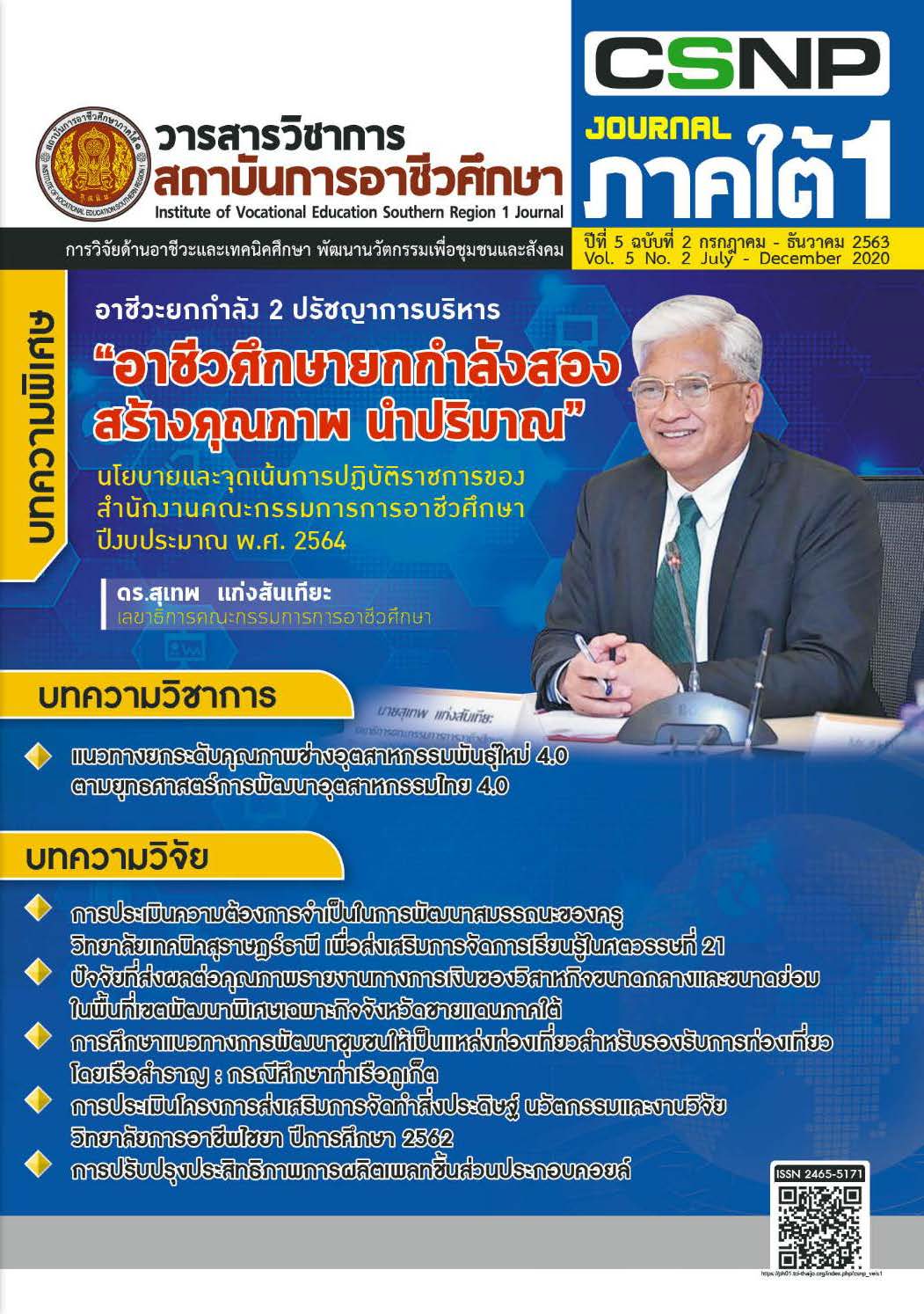The Development of Training Courses to Enhance the Ability to Use Digital Technology Competency on Testing and Evaluating for Vocational Teachers
Keywords:
The Development of Training Courses for Vocational Teachers, Ability to Use Digital Technology Competency, Testing and Evaluating in Actual SituationAbstract
The objectives of this research were to: 1) develop training courses to enhance the ability to use digital technology competency on testing and evaluating for vocational teachers and 2) evaluate the training course based on the actual performance of the vocational teachers. The data were collected from 113 teachers from 100 vocational institutes derived by simple random technique. The study was one group pretest posttest design in the academic year 2562 BE. The research instrument consisted of the evaluation form to measure the actual performance, the evaluation form to measure the actual ability on digital technology, the evaluation form to find the satisfaction of the trainees and the evaluation form to supervise the trainees in applying the knowledge to their actual situation. The data were analyzed to find percentage, SD, relative gain scores, and dependent T-test.
The results showed that: 1) the training courses to enhance the ability to use digital technology competency on testing and evaluating for vocational teachers consisted of 6 main components, i.e. background and rationale of the course, course objectives, course content, course activities, teaching media, and course evaluation. The course objectives and the materials were congruent with very high possibility in applying in the real situation. 2) The results of the actual performance of the trainees was significant at 0.05 level. The ability to use digital technology on testing and evaluating was at 85%. Moreover, the trainee reported overall satisfaction at very high level. Finally, the follow-up supervising revealed high quality in applying the knowledge in real situation.
References
[2] ฉัตรพงศ์ ชูแสงนิล. (2562). [ออนไลน์]. สุดยอดแอพพลิเคชั่นแห่งการประเมินผลการเรียนรู้. [สืบค้นเมื่อวันที่ 18 กรกฎาคม 2562]. จาก https://www.scimath.org/article-technology/item/10115-2019-04-19-03-47-12
[3] กฤธยากาญจน์ โตพิทักษ์. (2559). แนวคิดการประเมินที่สอดคล้องกับการเรียนรู้ของนิสิตในยุคศตวรรษที่ 21 : การประเมินการเรียนรู้ตามสภาพจริง.มหาวิทยาลัยเทคโนโลยีราชมงคลศรีวิชัย สงขลา. (เอกสารอัดสำเนา).
[4] ณัฐชานันท์ นุเสน. (2561). กระบวนการพัฒนาครู ด้านการวัดและประเมินผลตามสภาพจริง โรงเรียนสังกัดองค์การบริหารส่วนจังหวัด. วารสารมนุษยศาสตร์และสังคมศาสตร์ มหาวิทยาลัยราชภัฏพิบูลสงคราม. ปีที่ 12 ฉบับที่ 2 กรกฎาคม-ธันวาคม 2561. 409-426.
[5] Hartley, S. (2011). Communication, Cultural and Media Studies: the Key Concepts. Oxford : Routledge.
[6] กณิชชา ศิริศักดิ์. (2559). การวิจัยหลักสูตรวิชาชีพครูเพื่อพัฒนาแนวทางการส่งเสริมสมรรถนะดิจิทัล.ปริญญามหาบัณฑิต. ภาควิชาวิจัยและจิตวิทยาการศึกษา. ครุศาสตร์จุฬาลงกรณ์มหาวิทยาลัย.
[7] วิไลวัลย์ โพธิ์ทอง. (2561). เทคโนโลยีกับการเรียนรู้ตลอดชีวิตของครู. วารสารการวิจัยเพื่อพัฒนาชุมชน มหาวิทยาลัยนเรศวร. ปีที่ 11 ฉบับที่ 2 เมษายน-มิถุนายน 2561. 18-26.
[8] อดิศักดิ์ จำปาทอง. (2556). Digital Spherere โลกยุคใหม่ของสื่อดิจิทัล. กรุงเทพธุรกิจ. [วันพุธ ที่ 21 มีนาคม 2556].
[9] พิพัฒน์ อัฒพุธและคณะ. (2560). ผลการใช้สื่อสังคมออนไลน์ร่วมกับการเรียนรู้เชิงรุก วิชาการออกแบบ และผลิตสื่อกราฟิกคอมพิวเตอร์ สำหรับนักศึกษาระดับชั้นปริญญาตรี. วารสารศึกษาศาสตร์ มหาวิทยาลัยนเรศวร. ปีที่ 19 ฉบับที่ 2 เมษายน-มิถุนายน 2560. 145-154.
[10] โกมาตร จึงเสถียรทรัพย์. (2562). ความเป็นมนุษย์ในโลกดิจิทัล.ปาฐกถาเปิดการประชุมวิชาการมานุษยวิทยาครั้งที่ 13 หัวข้อ “มนุษย์ในโลกดิจิทัล” ศูนย์มานุษยวิทยาสิรินธร (องค์การมหาชน) วันที่ 4 กรกฎาคม 2562.
[11] แขก มูลเดช. (2555). การพัฒนาหลักสูตรฝึกอบรม เรื่อง การวัดและการประเมินผลการเรียนรู้. รายงานการวิจัย มหาวิทยาลัยราชภัฏเพชรบูรณ์.
[12] ปัฐมาภรณ์ พิมพ์ทอง และคณะ. (2558). การพัฒนาครูผู้สอนเพื่อส่งเสริมการสร้างคุณลักษณะที่พึงประสงค์ตามหลักปรัชญาเศรษฐกิจพอเพียงของนักเรียนในภาคตะวันออกเฉียงเหนือ. วารสารศึกษาศาสตร์ปริทัศน์. ปีที่ 30 ฉบับที่ 2 พฤษภาคม-สิงหาคม 2558. 112-113.
[13] สุทธนู ศรีไสย์. (2551). สถิติประยุกต์สำหรับงานวิจัยทางสังคมศาสตร์. พิมพ์ครั้งที่ 3. กรุงเทพมหานคร: คณะครุศาสตร์จุฬาลงกรณ์มหาวิทยาลัย.
[14] พงศ์เทพ จิระโร. (2556). เอกสารประกอบการอบรมโครงการพัฒนาคุณภาพการจัดการเรียนการสอนโดยวิธีการวัดและประเมินผลตามสภาพจริงและการวิจัยเพื่อเสริมสร้างศักยภาพครูผู้สอน.
[15] Kanjanawasee, S. (1989). Alternative strategies for policy analysis : An assessment of school effects an students’ cognitive and effective mathematics outcomes in lower secondary school in Thailand. Doctoral Dissertation.LA : university of California.



